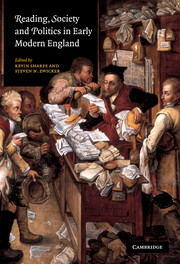Book contents
- Frontmatter
- Contents
- List of illustrations
- List of contributors
- Acknowledgements
- Introduction: discovering the Renaissance reader
- Part I THE MATERIAL TEXT
- Part 2 READING AS POLITICS
- Part 3 PRINT, POLITICS AND PERFORMANCE
- 5 Performances and playbooks: the closing of the theatres and the politics of drama
- 6 Irrational, impractical and unprofitable: reading the news in seventeenth-century Britain
- Part 4 READING PHYSIOLOGIES
- Part 5 READING IN THE TIME
- Index
6 - Irrational, impractical and unprofitable: reading the news in seventeenth-century Britain
Published online by Cambridge University Press: 22 September 2009
- Frontmatter
- Contents
- List of illustrations
- List of contributors
- Acknowledgements
- Introduction: discovering the Renaissance reader
- Part I THE MATERIAL TEXT
- Part 2 READING AS POLITICS
- Part 3 PRINT, POLITICS AND PERFORMANCE
- 5 Performances and playbooks: the closing of the theatres and the politics of drama
- 6 Irrational, impractical and unprofitable: reading the news in seventeenth-century Britain
- Part 4 READING PHYSIOLOGIES
- Part 5 READING IN THE TIME
- Index
Summary
When Gabriel Harvey sat at his desk, his copy of Livy before him, surrounded by other works with which he intended to compare the Roman history, he did so with a clear sense of purpose: he wished to contrive practical advice for policymakers, and thereby to make himself a useful reader. John Dee studied his occult manuscripts and books with an objective in mind: to furnish himself with a better understanding of nature and providence, to further his insight into the Magus's arts, to draw closer to the philosopher's stone. When John Milton read Euripides, it was perhaps for pleasure, but also to acquire the solid learning of a gentleman, and to tool himself the better to achieve his literary ambitions. When Thomas Hobbes read Thucydides, he sought knowledge of history and good government. In the most everyday of reading encounters, readers consulted the Bible, seeking comforting words, the advice of their maker or his Son, and surer knowledge of salvation or the paths that led to it.
Historians of the practices and interests of early modern readers have shown the centrality of reading to early modern history, especially but not exclusively cultural and intellectual history. They have emphasized the importance of ratio and utilitas in the conscious intentions of readers, and the sophistication of readers and their interpretive strategies. Reading, we are told, was ‘utilitarian or preparatory’ and radically analytic. Texts were anatomized and fragmented, individual words were subjected to perspicacious scrutiny.
- Type
- Chapter
- Information
- Reading, Society and Politics in Early Modern England , pp. 185 - 212Publisher: Cambridge University PressPrint publication year: 2003
- 3
- Cited by



